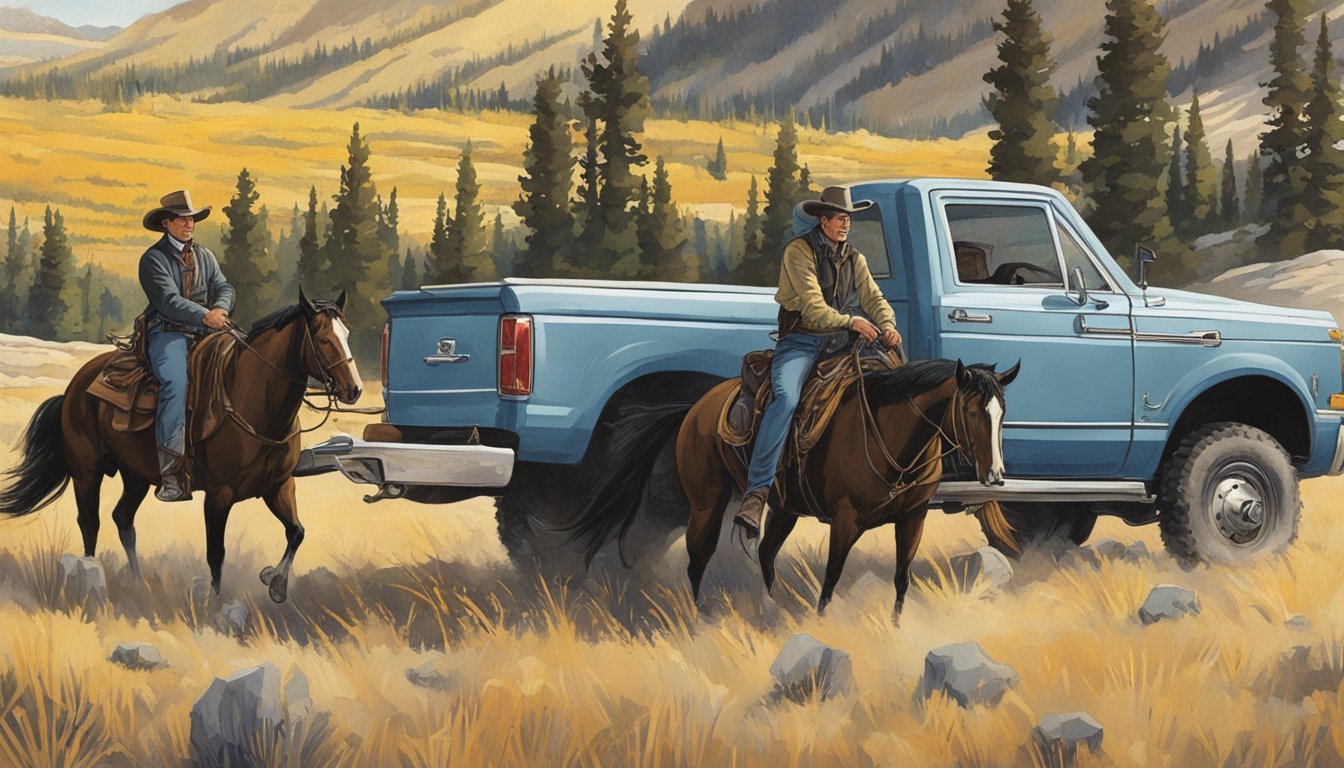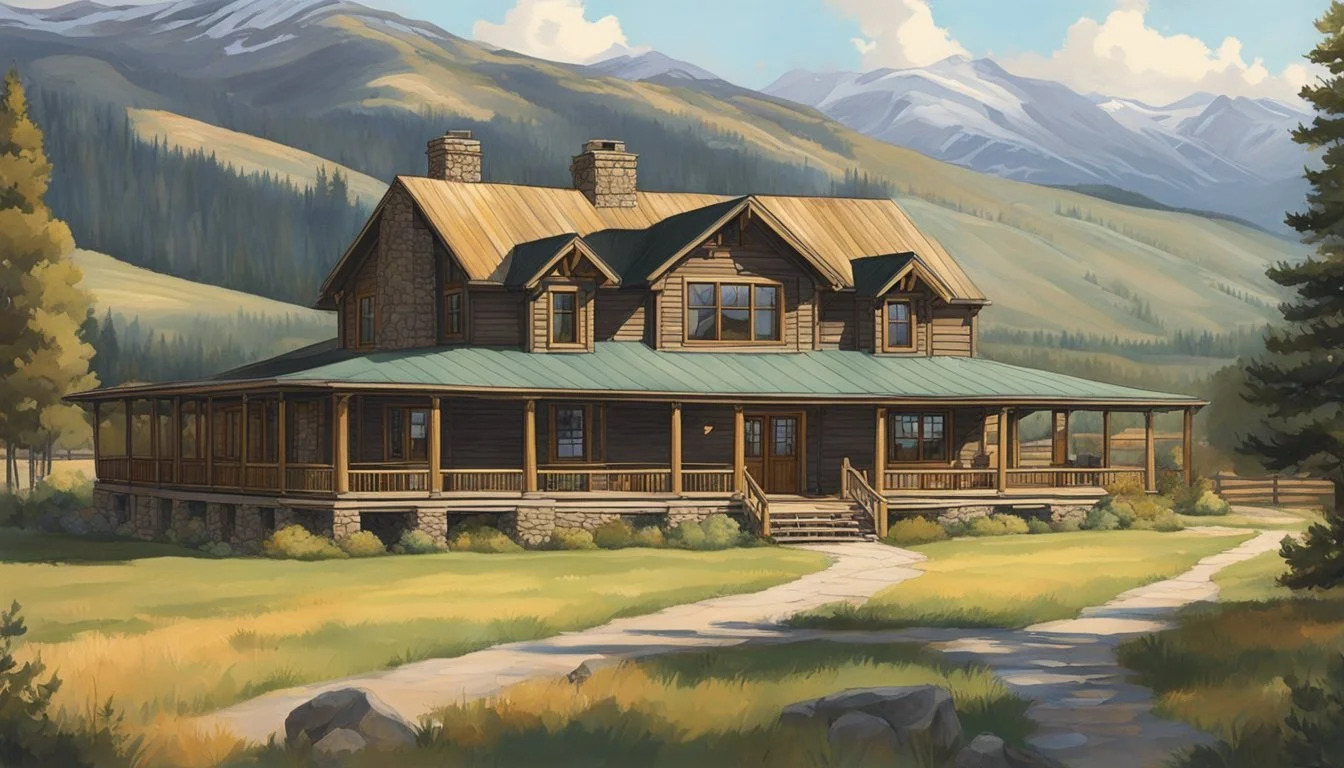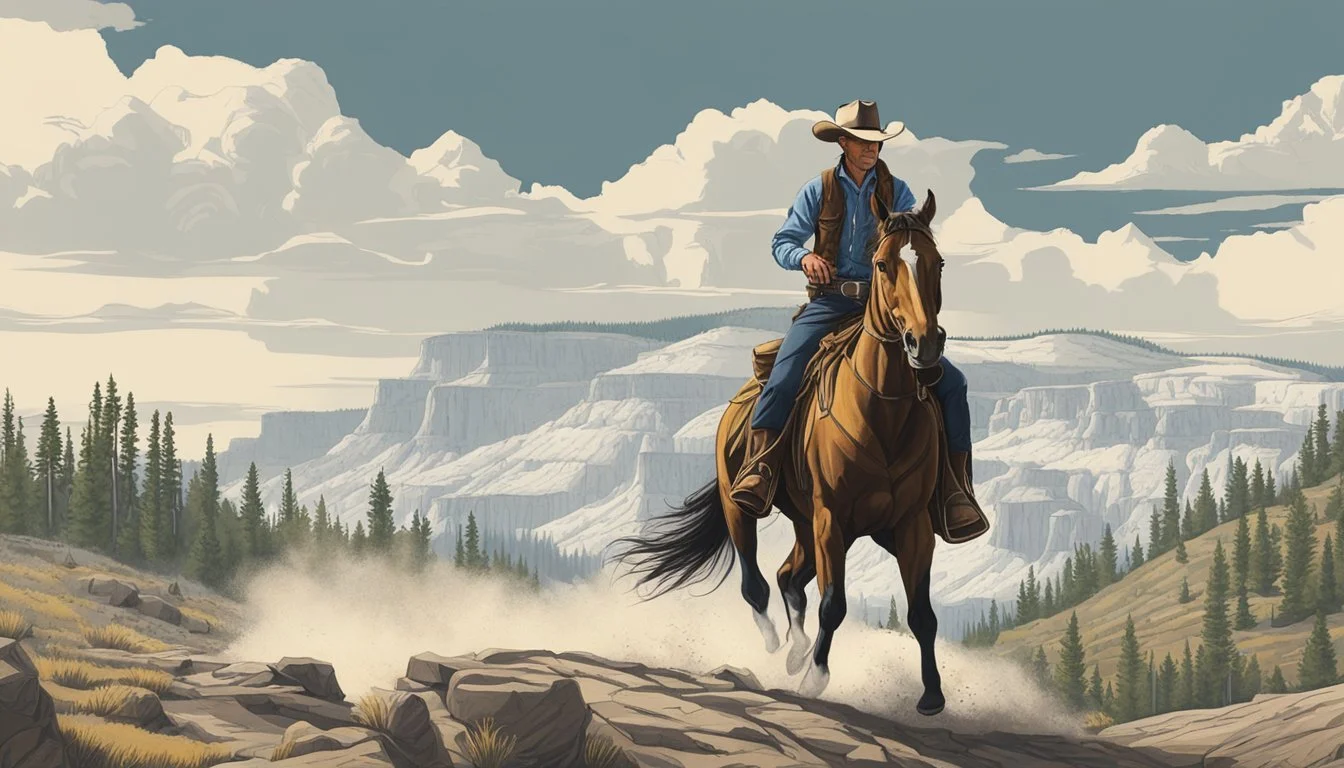Secrets of the Dutton Family Code Exposed in Yellowstone's Gripping Saga
The Dutton family of Yellowstone embodies a complex code of honor deeply rooted in the American West. Their unwavering commitment to preserving their Montana ranch and way of life drives the gripping drama of the hit TV series. At the heart of the Dutton code lies a paradoxical blend of fierce loyalty and ruthless violence, reflecting the harsh realities of modern ranching and the struggle to maintain traditional values in a changing world.
John Dutton, the family patriarch portrayed by Kevin Costner, serves as the central figure upholding this code. His actions reveal a man torn between protecting his legacy and adapting to the pressures of contemporary society. The show explores how this internal conflict ripples through the Dutton family, shaping their relationships and decisions.
Yellowstone's portrayal of the Dutton family code resonates with audiences by tapping into timeless themes of honor, family, and the American frontier spirit. It raises thought-provoking questions about the moral compromises people make to defend their way of life and the true cost of maintaining a legacy in the face of relentless change.
The Dutton Family Legacy
The Dutton family's legacy is deeply rooted in the harsh landscape of Montana, shaped by generations of strong-willed patriarchs and matriarchs. Their story intertwines with the land they fiercely protect, creating a complex tapestry of power, loyalty, and survival.
Patriarchal Figures and Family Roots
James Dutton, the family's pioneer patriarch, established the Yellowstone Ranch in the late 19th century. His tenacity and vision laid the foundation for the Dutton empire. John Dutton II continued this legacy, expanding the ranch's influence and instilling core values of hard work and loyalty in his children.
The Dutton name became synonymous with resilience and determination. Each generation faced unique challenges, from harsh winters to economic downturns, strengthening their resolve to preserve their land and way of life.
John Dutton's Leadership
John Dutton III, the current patriarch, embodies the family's unyielding spirit. His leadership style blends traditional ranching values with shrewd business acumen. John's unwavering commitment to the ranch often puts him at odds with modern progress and political maneuvering.
Under John's guidance, the Yellowstone Ranch has become more than just land - it's a symbol of the Dutton family's power and influence in Montana. His children, though often conflicted, play crucial roles in maintaining this legacy.
John's decisions, both personal and professional, are driven by a singular goal: ensuring the ranch's survival for future generations.
Evelyn and the Matriarchal Influence
Evelyn Dutton, John's late wife, played a pivotal role in shaping the family dynamics. Her strong presence and values continue to influence the Dutton children long after her passing. Evelyn's legacy is evident in the fierce loyalty and complex relationships among the siblings.
Her untimely death left a void in the family, affecting each member differently. Beth's sharp business acumen and Jamie's legal prowess can be traced back to Evelyn's influence. Kayce's struggle between family duty and personal desires reflects the internal conflicts Evelyn herself may have faced.
The matriarchal influence extends beyond Evelyn, with figures like Margaret Dutton from earlier generations contributing to the family's enduring legacy.
Yellowstone Ranch: The Heart of Conflict
Yellowstone Ranch stands at the epicenter of fierce conflicts over land, resources, and cultural heritage in Montana. Its vast acreage and strategic location near Yellowstone National Park make it a lightning rod for disputes involving multiple stakeholders.
Land Ownership and Stewardship
The Dutton family's claim to Yellowstone Ranch dates back generations, rooted in a legacy of ranching and land stewardship. Their ownership faces constant challenges from developers, government entities, and rival ranchers seeking to acquire or divide the property.
The ranch's economic importance to the local community adds complexity to land disputes. It provides jobs and maintains traditional ways of life, yet its vast size limits opportunities for new landowners and businesses.
Legal battles over property lines, water rights, and grazing permits are frequent. The Duttons employ both legal means and force to defend their claim, viewing the land as their birthright and a sacred trust.
Native American Relations and Rights
Tensions between the Dutton family and local Native American tribes, particularly the fictional Broken Rock Reservation, stem from competing claims to ancestral lands. The ranch occupies territory with deep historical and spiritual significance to indigenous peoples.
Broken Rock leaders assert their right to reclaim portions of Yellowstone Ranch through legal channels and public pressure. They argue that historical treaties and land grabs unjustly deprived them of their heritage.
Cultural clashes arise over land use practices, hunting rights, and access to sacred sites. The Duttons struggle to balance their interests with respecting Native American traditions and legal obligations.
Environmental Conservation
Yellowstone Ranch's proximity to Yellowstone National Park places it at the forefront of conservation debates. The Duttons face pressure to adopt more sustainable ranching practices and protect wildlife habitats.
Environmental groups criticize the ranch's impact on local ecosystems, particularly regarding water usage, grazing practices, and predator control. They push for increased regulation and land set-asides for conservation.
The family sees themselves as stewards of the land, balancing ranching traditions with evolving environmental concerns. They implement some conservation measures while resisting external control over their property and operations.
Climate change adds urgency to these conflicts, affecting water availability, wildfire risks, and rangeland health. The ranch must adapt to shifting environmental conditions while maintaining its economic viability.
Power and Relationships
The Dutton family's complex web of relationships is inextricably linked to their pursuit and maintenance of power. Loyalty, trust, and betrayal shape the dynamics within the family and their interactions with outsiders.
Family Loyalties and Betrayals
John Dutton's children navigate a minefield of competing loyalties. Beth's fierce dedication to her father contrasts sharply with Jamie's wavering allegiance. Kayce struggles to balance his commitment to the ranch with his responsibilities to his wife and son.
Family bonds are tested repeatedly. Jamie's adoption revelation strains his relationship with John. Beth's childhood trauma fuels her animosity towards Jamie. These fractures in family unity threaten the Duttons' grip on power.
Blood ties don't guarantee loyalty on the Yellowstone ranch. The characters must continually prove their worth and dedication to the family legacy.
Alliances and Power Struggles
The Duttons forge strategic alliances to protect their interests. John's partnership with Governor Perry secures political influence. Beth's corporate maneuvering counters market forces threatening the ranch.
Internal power struggles simmer beneath the surface. Beth and Jamie vie for their father's approval and a greater role in ranch operations. Kayce's leadership potential poses a subtle challenge to the established hierarchy.
External threats force the family to close ranks. Market Group's attempted takeover unites the Duttons against a common enemy. The Beck brothers' violent tactics strengthen family bonds in the face of danger.
Dynamics of Trust within the Dutton Household
Trust is a precious commodity on the Yellowstone ranch. John relies heavily on Rip, valuing his unwavering loyalty. Beth's sharp instincts make her a trusted advisor in family matters.
The ranch hands' loyalty is earned through a mix of respect, fear, and a shared code of honor. The bunkhouse becomes a microcosm of the larger power dynamics at play on the ranch.
Breaches of trust carry severe consequences. Jamie's betrayals result in his estrangement from the family. Monica's outsider status and conflicting loyalties strain her relationship with Kayce and the rest of the Duttons.
Characters' Journey and Psychological Layers
The Dutton family members and their allies undergo complex psychological transformations throughout Yellowstone. Their journeys reveal deep-seated motivations, internal conflicts, and evolving relationships that drive the series' narrative.
Kevin Costner's Portrayal as John Dutton
Kevin Costner brings depth and nuance to John Dutton, the patriarch of the Yellowstone ranch. His performance captures John's unwavering determination to protect his land and legacy. Costner conveys John's inner turmoil as he navigates the challenges of maintaining power and family loyalty.
John's character arc reveals a man grappling with his moral code in a changing world. His interactions with his children and enemies alike showcase his complex nature. Costner's subtle expressions and commanding presence bring authenticity to John's struggles with leadership and fatherhood.
The Arc of Beth and Jamie Dutton
Beth and Jamie Dutton's journeys are marked by sibling rivalry and personal demons. Beth's fierce loyalty to her father contrasts sharply with her antagonistic relationship with Jamie. Her character development reveals layers of trauma and resilience.
Jamie's path is one of conflicted loyalties and a search for identity. His legal expertise often clashes with family expectations, leading to pivotal decisions that shape the series' plot. The dynamic between Beth and Jamie drives much of the show's emotional tension.
Their individual growth and interactions highlight themes of family, trust, and the lasting impact of childhood experiences.
Rip Wheeler and Kayce Dutton: The Complexity of Support Characters
Rip Wheeler and Kayce Dutton serve as vital support characters, each with their own compelling arcs. Rip's unwavering loyalty to John Dutton and his relationship with Beth add emotional depth to the series. His journey from orphaned ranch hand to trusted confidant showcases themes of found family and redemption.
Kayce's character balances his Dutton legacy with his life as a husband and father. His military background and connection to his Native American wife's culture create unique conflicts. Kayce's growth throughout the series reflects the struggle between duty and personal desires.
Both Rip and Kayce's roles highlight the importance of chosen family and the complexities of loyalty in the Yellowstone universe.
Cultural and Social Tapestry of Yellowstone's America
The Dutton family saga in Yellowstone portrays a complex cultural landscape where traditional Western values clash with modern societal pressures. This dynamic setting explores themes of justice, preservation, and the changing face of the American West.
Depiction of the Modern Western
Yellowstone presents a contemporary take on the Western genre, blending classic themes with current issues. The show depicts vast Montana landscapes alongside modern technology and corporate interests. Ranching traditions coexist with smartphones and luxury vehicles, creating a unique visual and thematic contrast.
The Dutton family embodies this duality, maintaining century-old practices while navigating present-day challenges. Their struggles reflect the broader tensions between preserving a way of life and adapting to change.
Taylor Sheridan's storytelling captures the essence of the modern Western, showcasing how age-old conflicts over land and resources persist in new forms.
The Role of Frontier Justice and Ethics
Frontier justice plays a central role in Yellowstone, with characters often taking matters into their own hands. The Dutton family frequently operates outside the law, justifying their actions as necessary for survival and protection of their legacy.
This approach raises ethical questions about the limits of self-reliance and the role of formal legal systems in remote areas. The show explores how traditional notions of frontier justice clash with modern legal expectations.
Characters grapple with moral dilemmas, weighing personal codes of honor against societal norms. This tension creates a morally ambiguous landscape where right and wrong are not always clear-cut.
Cultural Preservation and Rugged Individualism
Yellowstone emphasizes the importance of cultural preservation in the face of encroaching modernization. The Dutton family serves as guardians of a vanishing way of life, fighting to maintain ranching traditions and cowboy culture.
Rugged individualism and self-reliance are portrayed as core values of the American West. Characters demonstrate fierce independence and a distrust of outside interference, especially from government entities.
The show explores how these ideals both strengthen and isolate communities. It highlights the challenges of preserving cultural identity while adapting to societal changes and economic pressures.
The Impact of Corporate Greed and Expansion
Corporate interests emerge as a significant threat to the Dutton family's way of life in Yellowstone. The series portrays the aggressive expansion of businesses seeking to exploit natural resources and develop land for profit.
This storyline reflects real-world tensions between rural communities and urban development. The show examines how corporate greed can disrupt local economies and erode traditional lifestyles.
Yellowstone also explores the complex relationships between Native American tribes, ranchers, and corporations. It highlights the ongoing struggles over land rights and resource management in the modern West.
The series raises questions about the sustainability of ranching in the face of economic pressures and changing land use patterns.
Life on the Yellowstone Dutton Ranch
The Yellowstone Dutton Ranch embodies the rugged spirit of the American West. It demands unwavering dedication, physical stamina, and a deep connection to the land from those who call it home.
Ranch Operations and Daily Challenges
Ranch life on the Yellowstone begins before dawn. Cowboys saddle up to check on cattle, mend fences, and manage grazing rotations. The work is physically demanding and never-ending.
Seasonal tasks like branding, calving, and hay harvesting require all hands on deck. Modern technology assists, but traditional horsemanship remains crucial.
Weather poses constant threats. Droughts stress water supplies and forage, while harsh winters endanger livestock. Predators like wolves and bears add another layer of vigilance to daily operations.
Financial pressures loom large. Fluctuating cattle prices and rising operational costs force the Duttons to diversify income streams through tourism and land leases.
The Importance of Resilience and Grit
Survival on the Yellowstone Ranch demands mental toughness. The Duttons face relentless challenges from nature, rivals, and changing times.
Their deep-rooted work ethic fuels long days of grueling labor. They push through physical exhaustion, injuries, and harsh conditions without complaint.
This grit extends beyond physical tasks. The family navigates complex political and business landscapes to protect their legacy. They make difficult decisions, often at great personal cost.
Adaptability is key. The Duttons blend traditional ranching methods with modern innovations to stay competitive. They teach younger generations to be resourceful and self-reliant.
Conservation vs. Development: The Ongoing Struggle
The Yellowstone Dutton Ranch sits at the crossroads of preservation and progress. Encroaching development threatens both their way of life and the pristine landscape.
The Duttons fight to maintain open spaces and wildlife corridors. They implement sustainable grazing practices and work with conservation groups to protect ecosystems.
Yet economic realities create difficult choices. The family must balance their stewardship ideals with the need for financial stability. This often leads to conflicts with developers, environmentalists, and government agencies.
Tourism offers a potential compromise. The ranch's natural beauty and cowboy experiences attract visitors, providing income while showcasing the value of preserving working ranchlands.





